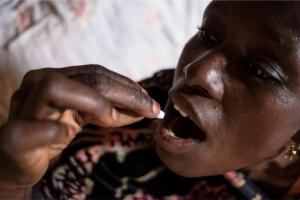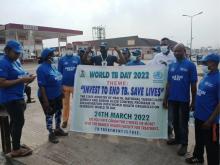Amidst COVID-19 response, WHO and partners support Nigeria towards attaining a TB free- status
Abuja, 31 March, 2022 - When Ms Tina Amos, a 42-year-old mother of five residing at Byazhin, Bwari Local Government Area (LGA), Abuja learnt she had tuberculosis (TB), she thought that was the end of her life, believing she had no hope for survival.
Three months after the diagnosis, Mrs Amos was all smiles as she walked into the doctors' consultation room at the Primary Health Care centre (PHC) in her neighborhood, where she has been receiving medication, thanks to the effort of the government, WHO and other partners.
“I was coughing for over three months, my body was always hot, I kept sweating, lost weight and was using local herbs, but it was not working. My family and friends were concerned about the persistent cough, and a neighbor advised me to go to the PHC. At the PHC, the doctor referred me to Kubwa General (Hospital), where I was diagnosed with TB and sent back with my result to the PHC to start treatment. I have been coming here to collect drugs and I feel better.
The treatment has been free. People who have been coughing for more than two weeks should visit the hospital. I now know that TB is curable”, she said.
Intensifying case search
Despite the COVID-19 pandemic, the World Health Organization (WHO) and its partners have continued to support the Government of Nigeria in combatting the TB scourge.
For Nigeria to attain the Sustainable Development Goals, active TB case finding is vital in combatting the scourge of the disease as over 300 000 cases are estimated to be missed annually.
To improve TB case findings, notwithstanding the pandemic, the WHO, with the support of USAID, convened a multi-stakeholder meeting to leverage COVID-19 response to drive a joint TB/COVID-19 bidirectional screening, vaccination.
Dr Ufuoma Aduh, WHO Surveillance Officer for TB, said the similarity of TB and COVID-19 symptoms and the expansive national and subnational structures for TB control presents an opportunity to scale up access.
He posited that the existing platform of the TB control programme presents the opportunity to scale up and institutionalize case finding, vaccine access, testing and treatment for COVID. Also, joint TB and COVID activities allow the opportunity to track the pandemic in Nigeria. activities.
Commemorating 2021 World TB Day
To underscore the importance of raising awareness for TB eradication globally, WHO joined the government of Nigeria at the Federal and State levels to commemorate the World TB day on 24 March 2022.
In states like Ebonyi and Ondo, the WHO field offices joined the States in sensitization and awareness campaigns in public spaces which were widely published by the media.
In a Press briefing in Abuja, the WHO Country Representative, Dr Walter Kazadi Mulombo, appreciated Nigeria's 2021 outstanding achievement of a 50% increase in TB notification compared to 2020 despite the impact of the COVID 19 pandemic.
In 2020 and 2021, the reported data indicate that there has been an increase in annual tuberculosis (TB) case notification due to strategic intervention by the National Tuberculosis, Buruli Ulcer and Leprosy Control Program (NTBLCP), in collaboration with WHO and other stakeholders working on TB control and elimination in Nigeria.
It is on record that in 2020, Nigeria notified a total of 138,591 cases; 15% higher compared to 120,266 cases notified in 2019. Similarly, in 2021, the country notified 207,785 TB cases; 50% higher compared to the number notified in 2020.
According to Dr Mulombo, “It is a notable milestone for the country, with above 200,000 TB cases notified in a single year. Nigeria is among the few countries that registered increased TB case notification in 2021. The theme for this year "Invest to End TB. Save lives" and the slogan " Give more, Do more, to End TB now," conveys the urgent need for more resources to be invested to ramp up the fight against TB in line with commitments to end TB made by global leaders.”
He further pledged that WHO will continue to support in keeping TB control strategies up to date, strengthening partnerships, fostering innovation, finding missing cases and building capacity for all facets of TB control
World TB Day is observed on 24 March yearly to raise public awareness about one of the deadliest infectious diseases in the world and its devastating health, social and economic impacts. In Nigeria, TB treatment lasts between six and 12 months, and to be cured, if affected people should not skip a single dose.
Technical Contact:
Dr Oyama Enang; Email: oyamae [at] who.int (oyamae[at]who[dot]int)




